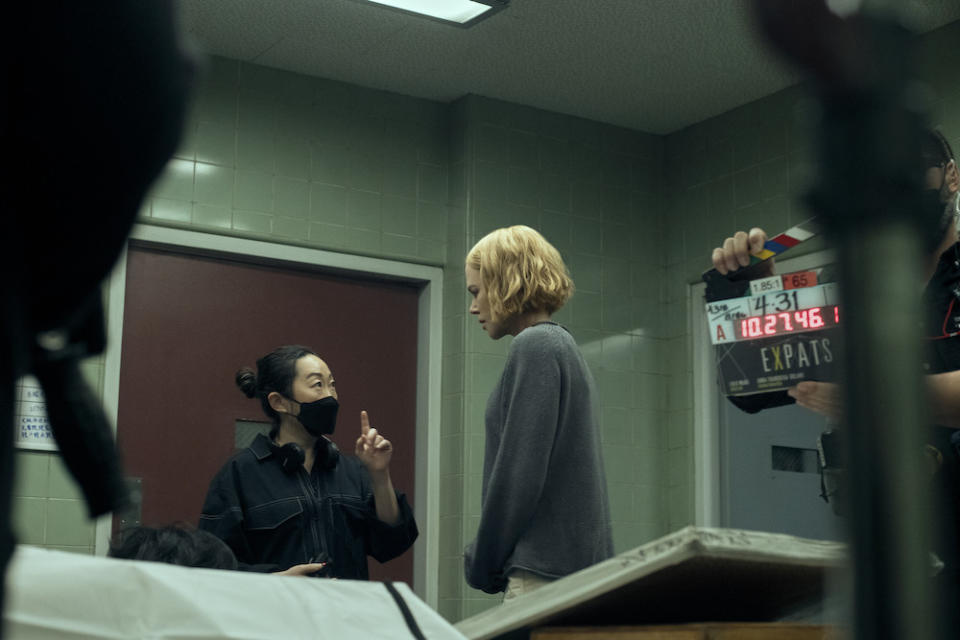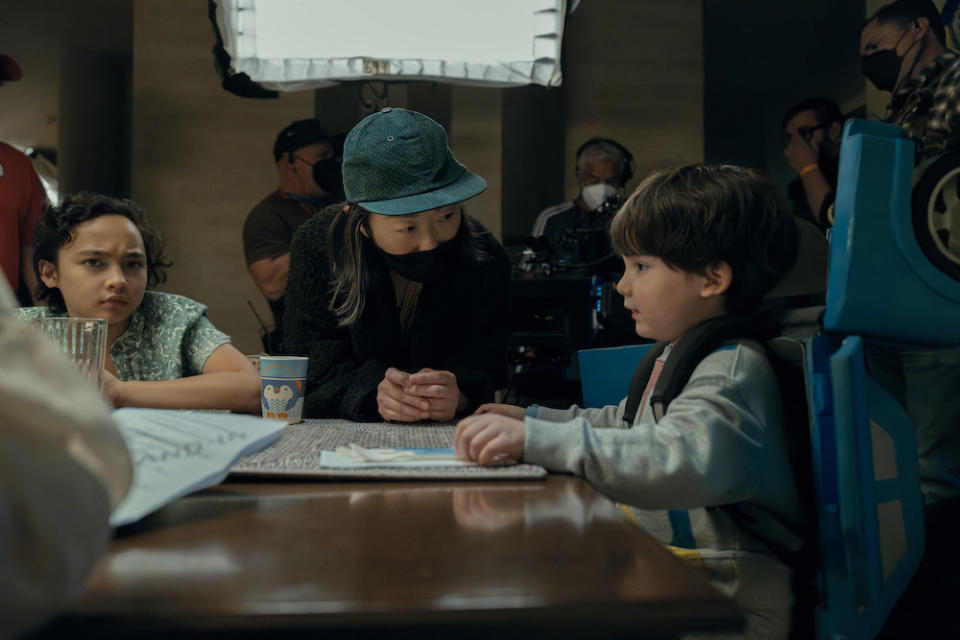Lulu Wang Took the First Pitch for ‘Expats,’ Flipped It on Its Head, and Delivered a Staggering TV Event


On June 6, the 2024 IndieWire Honors ceremony will celebrate 13 creators and stars responsible for some of the most stellar work of the TV season. Curated and selected by IndieWire’s editorial team, the event is a new edition of previous IndieWire Honors ceremonies, this time focused entirely on television. We’re showcasing their work with new interviews leading up to the Los Angeles celebration.
“Expats,” the immense yet intimate six-part series from director and showrunner Lulu Wang, tells the story of three American women living in Hong Kong who become inextricably linked by tragedy. That loss, so harrowing it’s often kept vague in plot synopses, is the disappearance of a young boy. Left unattended in a crowded night market for a split second, Gus (Connor James) is just gone. There’s no indication if he’s been taken or he merely wandered off. His mother, Margaret (Nicole Kidman), is inconsolable. Gus’ auditioning babysitter, Mercy (Ji-young Yoo) retreats into a self-destructive loop. Soon, Margaret’s neighbor, Hilary (Sarayu Blue), gets involved, her efforts to help clouded by her own marriage problems.
More from IndieWire
Adapted from Janice Y.K. Lee’s novel, “The Expatriates,” the series relies on what’s unknown to each woman to ask universal questions of its audience. Instead of asking, “What happened to Gus?” “Expats” asks us to weigh what each explanation tells us about the people, the country, and the world we live in. Instead of asking, “How can we fix what’s been broken?” the series asks how we can live with grief… and how we can live with someone who’s grieving. How much bad behavior does grief excuse? And who can afford to grieve in the first place, whether the price is paid with time or support?
“I always think that life is about the juxtaposition of the ridiculous and the sublime,” Wang, who will receive the Crossover Award at IndieWire Honors, said in a recent interview. “We’re constantly doing things that, within a bigger context, seems absurd. To be upset about your eggs being burnt when there’s a war going on or when our rights are being taken away [is ridiculous]. But also, can we go through life with this constant awareness that we’re not supposed to ever be upset about anything because there’s a hierarchy of pain and suffering? Like, no, right?”
That vision didn’t fit the show that was first pitched to Wang, way back when Prime Video was trying to develop a TV series based on Lee’s book.
“It was much more of a whodunit — like a mystery or a crime drama,” Wang said about the initial pitch. “[But] that’s not what drew me to the novel. It’s actually the opposite. It’s actually: How do you cope with life when you can’t get the answers? Maybe that doesn’t have quite the engine of a seven-season series, but [this story] felt more like a meditation. It has its own engine — it’s still got intrigue, and there’s still suspense — but it’s emotional as opposed to a plot engine.”
As expatriates, each of the main characters (as well as their spouses) already feel adrift; torn between where they were born and where they live. Losing Gus only pushes them further out to sea. At first, they may panic and flail, grasping at anything to steady the ship. But learning to live without a paddle can also reveal unshakable truths that become their own irrefutable guidance system.
“It’s a show about privilege and people having such different perspectives, but allowing all of them to exist,” Wang said. “Rather than an engine going in one direction, it was more like an onion you peel back to put the audience in a place where they both empathize but then also judge the characters, because it’s like holding up a mirror to ourselves.”
Throughout “Expats,” there are a number of fiery scenes that force viewers to reconsider their assessments of each subject. Mercy, while very young, often invites trouble in ways that are hard to reconcile. Margaret, who earns immediate sympathy as the mother of a missing kid, provokes sharp, sudden apathy when she goes off on Hilary for never being able “to understand why I do what I do or feel what I feel because you’re not a mother.” Hillary, too, tests our compassion when, while preoccupied with thoughts of her cheating husband, she takes advantage of her housekeeper’s kindness.
“When we were writing, I would be like, ‘Is this person too good?'” Wang said. “‘Let’s give them something really complicated’ — because it’s exciting to me, right? Thinking the audience really loves this person, really sides with them, and then they do something and you’re like, ‘Ooh.'”
“David, for example, is so easy to hate,” Wang said about Hilary’s unfaithful husband, played with an exquisite mix of charm and smarm by Jack Huston. “All of his behaviors, all of the choices that he makes are quite despicable. But throughout the series, we start to understand him more and more. We come to understand his own traumas. [I wondered,] ‘Will people side with him more?’ And the interesting thing is that so many people have been like, ‘I am David,’ or ‘I love David!’ It’s shocking to me how much people are willing to admit that they like or actually see themselves in David.”

It’s reactions like these that reinforce Wang’s belief that there’s “a lot of tolerance” in the world.
“We make assumptions,” she said. “We see somebody and we’re like, ‘God, that guy’s an asshole.’ He said this thing and we’re judging them based on this one moment and one interaction in time, as opposed to, ‘Well, what happened earlier in the day for that person?’ Or, ‘What are they going through?’ That’s why I always imagined Episodes 1 and 2 as a question and then the answer.”
Wang said running her first writer’s room “really opened up my thinking” about how to structure a story.
“You’re using the form to inform the storytelling itself,” she said. “Let’s really test our own skills as filmmakers to see all the different techniques we can bring to each episode. […] How do we surprise the audience, as opposed to just saying, ‘We left them in a cliffhanger and now we’re going to answer the question.'”
To Wang, Episode 1 invites the question: What happened here? But rather than cut straight to the answer in the next hour, Episode 2 takes the time to establish what life was like before Gus disappeared.
“We originally called that episode, ‘Disaster Drops Out of a Clear Blue Sky,’ because we wanted it to feel like everybody was happy, everything was perfect, the sky was blue, the kids are out running, and yet your life can change in a millisecond,” Wang said. “That’s the reality we all live with, and that’s what happened to this family and this community. In a millisecond, everything was different.”
Wang saw a similar dichotomy between Episodes 4 and 5. The former confines each of the main characters to tight quarters. Margaret and Clarke (Brian Tee) are in a morgue’s waiting room, where they’ve been asked to identify a body that could be their son’s. Hilary gets stuck in an elevator with her visiting mother, and Mercy can’t escape her own apartment, where David shares (and discovers) uncomfortable secrets. But Episode 5, “Central,” reframes the narrative through the eyes of domestic workers and student protesters, giving voice to the voiceless in such vivid human detail it’s impossible to see anyone in “Expats” as purely empathetic or completely callous.
“I knew we were going to break [things] open in the fifth episode,” Wang said. “So then in Episode 4, they should be trapped. Let’s do the opposite. Let’s make it really claustrophobic. Let’s have it feel like a play almost.”

Wang directs every episode and said the decision was motivated by her past as an independent filmmaker, as well as Kidman’s push during development for only “one or maybe two” directors. “She likes the continuity of having one vision,” Wang said. And she’s not alone. Once they decided to experiment with each episode’s style — from visual compositions to sound mixing — having Wang at the helm of every episode helped ensure the story would still add up to a “cohesive” whole.
“With Episode 5, we were like, ‘Let’s go with a wider aspect ratio. Let’s go cinemascope and make it really feel like a feature film that you would see on a big screen TV, to really honor all of these different people in this city,'” she said. “But then Episode 4, let’s keep it really contained. Let’s go fully handheld. It’s the only episode where we’re handheld. A lot of our episodes are really about control; about people who are trying to control their emotions. But in Episode 4, they’re starting to unravel, so we just went fully handheld with that episode — and also no music. Episode 5 is filled with music, and Episode 4, we just decided to have absolutely no score while they’re trapped inside of their specific spaces. You really feel the sound design.”
Form was of huge importance to Wang, who pitched taking the feature-length fifth episode to festivals in order to emphasize the unique qualities “Expats” had to offer. Episode 5 purposefully steers focus away from a bonafide star like Nicole Kidman and instead puts the emphasis on supporting characters — on housekeepers and students — in yet another effort to broaden viewers’ perspectives.
“With this series, it’s challenging who gets to be on a big screen — Episode 5 — who’s on a small screen — a movie star,” she said. “In addition to challenging perspective, we’re challenging forms. We’re challenging TV versus film, what’s cinema, what’s not? And there’s no clear, easy answers, but let’s just do something interesting.”
Perhaps that’s why Wang said what’s been most rewarding about “Expats'” reception so far is when it helps viewers process their own troubles.
“The most meaningful responses are when people who struggle with their own loss in life, who’ve been struggling, say they found hope — that they really connected with the ultimate meaning of the series, which for me is the sense of resilience no matter what you’re going through,” Wang said. “Also, I’ve gotten a lot of messages from people from Hong Kong just saying, ‘I’ve never seen my home represented in this way.’ It’s so beautiful, but also so sad because there’s so much that’s disappearing. The show is set in 2014, but it’s meant to be a reminder of everything that’s happened since then. There was so much hope in 2014, but I think as you watch it — because you know what happens after — there’s a sense of heartbreak, too.”
Hope and heartbreak. Questions and answers. The ridiculous and the sublime. “Expats” excels at breaking down unwieldy ideas — how individuals connect to a family, how families connect to a community, and how communities connect to society at large — into digestible parts. Wang’s series lives in the unknown space between opposite poles, reflecting the indecision, the searching, and the wonder that defines so much of our time on Earth.
It’s not always about choosing one extreme over the other; it’s about knowing where you are, and that you’re not alone.
“Expats” is available on Prime Video.
Best of IndieWire
The 14 Best Thrillers Streaming on Netflix in June, from 'Fair Play' to 'Emily the Criminal'
Unsimulated Sex Scenes in Film: 'Nymphomaniac,' 'The Brown Bunny,' 'Little Ashes,' and More
Every Palme d'Or Winner from the Cannes Film Festival, Ranked
Sign up for Indiewire's Newsletter. For the latest news, follow us on Facebook, Twitter, and Instagram.

 Yahoo News
Yahoo News 
